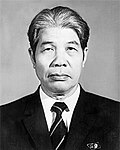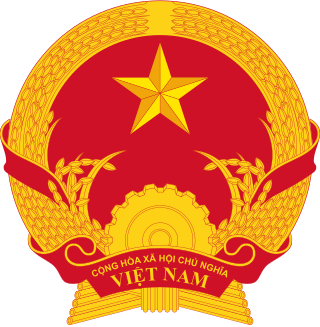
The politics of Vietnam is dominated by a single party under an authoritarian system, the Communist Party of Vietnam (CPV). The President of Vietnam is the head of state, and the Prime Minister of Vietnam is the head of government. Both of these offices are separate from the General Secretary of the Communist Party of Vietnam, who leads the CPV and is head of the Politburo and the Central Military Commission. The General Secretary is thus the de facto supreme leader of Vietnam. Executive power is exercised by the government and the President of Vietnam. Legislative power is vested in the National Assembly of Vietnam. The Judiciary is independent of the executive. The parliament adopted the current Constitution of Vietnam, Vietnam's fifth, on 28 November 2013.
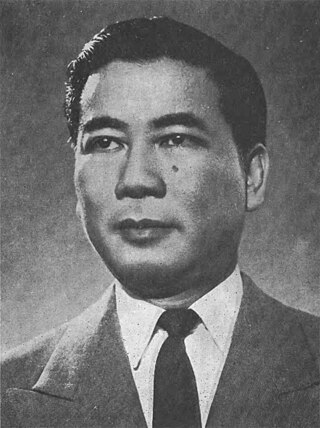
Ngô Đình Diệm was a South Vietnamese politician who was the final prime minister of the State of Vietnam (1954–1955) and later the first president of South Vietnam from 1955 until his capture and assassination during the CIA-backed 1963 South Vietnamese coup.

The Việt Minh was a national independence coalition formed at Pác Bó by Hồ Chí Minh on 19 May 1941. Also known as the Việt Minh Front, it was created by the Indochinese Communist Party (ICP) as a national united front to achieve the independence of the Democratic Republic of Vietnam.

The Viet Cong was an epithet and umbrella term to call the communist-driven armed movement and united front organization in South Vietnam. Formally organized as and led by the National Liberation Front of South Vietnam, it fought under the direction of North Vietnam against the South Vietnamese and United States governments during the Vietnam War. The organization had both guerrilla and regular army units, as well as a network of cadres who organized and mobilized peasants in the territory the Viet Cong controlled. During the war, communist fighters and some anti-war activists claimed that the Viet Cong was an insurgency indigenous to the South that represented the legitimate rights of people in South Vietnam, while the U.S. and South Vietnamese governments portrayed the group as a tool of North Vietnam. It was later conceded by the modern Vietnamese communist leadership that the movement was actually under the North Vietnamese political and military leadership, aiming to unify Vietnam under a single banner.

The Kingdom of Cambodia, also known as the First Kingdom of Cambodia, and commonly referred to as the Sangkum period, refers to Norodom Sihanouk's first administration of Cambodia from 1953 to 1970, an especially significant time in the country's history. Sihanouk continues to be one of the most controversial figures in Southeast Asia's turbulent and often tragic postwar history. From 1955 until 1970, Sihanouk's Sangkum was the sole legal party in Cambodia.
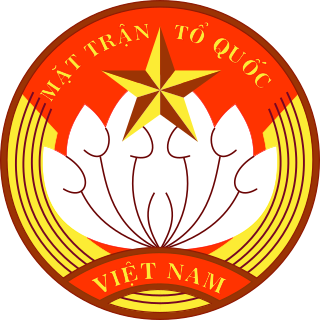
The Vietnamese Fatherland Front is an umbrella group of mass movements in Vietnam aligned with the Communist Party of Vietnam forming the Vietnamese government. It was founded in February 1977 by the merger of the Vietnamese Fatherland Front of North Vietnam and two Viet Cong groups, the National Liberation Front of South Vietnam and the Alliance of National, Democratic, and Peace Forces. It is an amalgamation of many smaller groups, including the Communist Party itself. Other groups that participated in the establishment of the Front were the Vietnam General Confederation of Labour, the Ho Chi Minh Communist Youth Union and the Ho Chi Minh Young Pioneer Organization. It also included the Democratic Party of Vietnam and Socialist Party of Vietnam, until they disbanded in 1988. It also incorporates some officially sanctioned religious groups.

The president of the Socialist Republic of Vietnam is the head of state of Vietnam, elected by the National Assembly of Vietnam from its delegates. Since Vietnam is a one-party state, candidates for the post are nominated by the Central Committee of the Communist Party of Vietnam. The officeholder is generally considered to hold the second-highest position in the political system, practically after the General Secretary of the Communist Party of Vietnam.
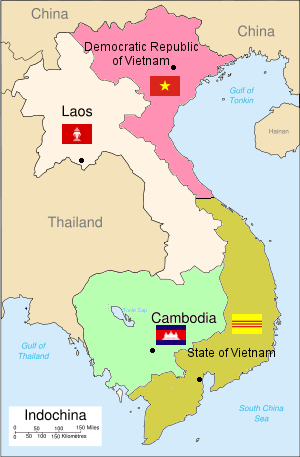
The Geneva Conference was intended to settle outstanding issues resulting from the Korean War and the First Indochina War and involved several nations. It took place in Geneva, Switzerland, from 26 April to 20 July 1954. The part of the conference on the Korean question ended without adopting any declarations or proposals and so is generally considered less relevant. On the other hand, the Geneva Accords that dealt with the dismantling of French Indochina proved to have long-lasting repercussions. The crumbling of the French colonial empire in Southeast Asia led to the formation of the states of the Democratic Republic of Vietnam, the State of Vietnam, the Kingdom of Cambodia, and the Kingdom of Laos. Three agreements about French Indochina, covering Cambodia, Laos, and Vietnam, were signed on 21 July 1954 and took effect two days later.

Elections in the Socialist Republic of Vietnam occur under a one-party political system led by the Communist Party of Vietnam (CPV). Direct elections occurred at both the local and national levels to elect members of the People's Councils and the National Assembly, with all candidate nominations pre-approved by the CPV-led Vietnamese Fatherland Front. Elections serve the purposes of information acquisition and cooptation rather than popularity contest but still remain of significance to the political life and legitimacy of the Vietnamese party-state.
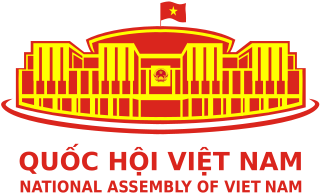
The National Assembly of the Socialist Republic of Vietnam is the unicameral parliament and the highest body of state power of Vietnam. The National Assembly is the only branch of government in Vietnam and, in accordance with the principle of unified power, all state organs are subservient to it.

The Việt Nam Quốc Dân Đảng, abbreviated VNQDĐ or Việt Quốc, was a nationalist and democratic socialist political party that sought independence from French colonial rule in Vietnam during the early 20th century. Its origins lie in a group of young Hanoi-based intellectuals who began publishing revolutionary material in the mid-1920s. In 1927, after the publishing house failed because of French harassment and censorship, the VNQDĐ was formed under the leadership of Nguyễn Thái Học. Modelling itself on the Kuomintang of Nationalist China the VNQDĐ gained a small following among northerners, particularly teachers and intellectuals. The party, which was less successful among peasants and industrial workers, was organised in small clandestine cells.
Parliamentary elections were held in South Vietnam on 30 August 1959, resulting in an overwhelming victory for President Ngô Đình Diệm and the government. The regime won all but two of the 123 seats in the National Assembly, taken by five pro-government political parties and pro-government independent candidates. The elections allowed some liberalization in terms of freedom of speech, but the Diệm regime continued to maintain rigid control over the election process. Despite considerable efforts in preventing a small number of opposition candidates from standing during the election through the use of army soldiers bussed in to stuff ballot boxes to support the pro-government candidates, two independent candidates from the opposition were elected – Phan Quang Đán and Phan Khắc Sửu. However, during the first inaugural session of the National Assembly, Đán and another independent deputy, Nguyễn Trân were not permitted to attend and were arrested and charged with electoral fraud. The election as a whole was described by a 1966 CIA report as the "dirtiest and most openly rigged" of all South Vietnamese elections.
The Krom Pracheachon, often referred to simply as Pracheachon, was a Cambodian political party that contested in parliamentary elections in 1955, 1958 and 1972.

Parliamentary elections were held in Vietnam on 22 May 2011. Since Vietnam is a single-party state, the ruling Communist Party of Vietnam was guaranteed to win a majority.
General elections were held in Cambodia on 1 May 1981 and marked the establishment of the new, Vietnamese-backed, state of the People's Republic of Kampuchea (PRK). The Kampuchean People's Revolutionary Party was the only party to contest the election, and won all 117 seats. Voter turnout was reported to be 97.8%.

Parliamentary elections were held in Vietnam on 25 April 1976, the first after the country was reunited following the North's military victory over the South the previous year. The Vietnamese Fatherland Front was the only party to contest the election, and won all 492 seats. Voter turnout was reported to be 98.8%.

Parliamentary elections were held in Vietnam on 20 July 1997. The Communist Party of Vietnam (CPV) was the only party to contest the election, although independent candidates were also allowed to run, but must be affiliated with the Vietnamese Fatherland Front (VFF), an umbrella organization that is also under the control of the CPV. The VFF won 447 of the 450 seats, of which the CPV won 382. Voter turnout was reported to be 99.6%.

Parliamentary elections were held in Vietnam on 19 May 2002. A total of 759 candidates, including 125 independents, contested the election. The Vietnamese Fatherland Front was the only organisation to nominate candidates, with 634 coming from the Communist Party of Vietnam and 125 being non-party members. The Communist Party won 447 of the 498 seats. Voter turnout was reported to be over 99%.

Parliamentary elections were held in Vietnam on 22 May 2016. The members of the National Assembly, which would subsequently appoint the Prime Minister, and deputies of People's Councils at all levels were to be elected.

Legislative elections were held in Vietnam on 23 May 2021 to elect members of the National Assembly, which would subsequently appoint the Prime Minister, and deputies of People's Councils. The election took place on a Sunday in line with local legislation. Results were announced on 10 June.

